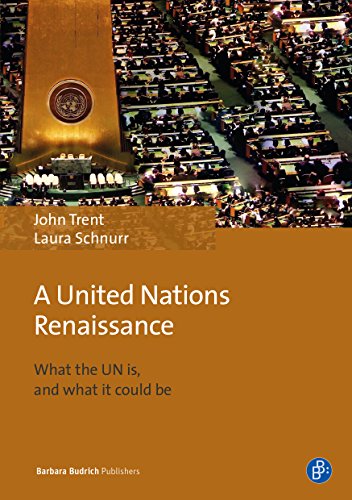A United Nations Renaissance: What the UN is, and What it Could be
Par : John Trent Laura Schnurr
Release date: Feb 2018
Barbara Budrich
Nombre de pages: 166
ISBN: 978-3-8474-0711-9


With yearly world military spending at US$1.7 trillion and no controls on nuclear weapons, the risks of civilization-ending conflict reached a 70-year high in 2017. Equally bad, climate change, terrorism, and financial failures are ramping up pressures on world stability. The risks are overwhelming. Yet for 70 years, the United Nations has held the world together in relative peace, economic cooperation and continuing development. It is the world’s voice.
Only the United Nations is capable of acting as an international forum, maintaining a world-wide channel of 24-hour dialogue and diplomacy. The UN often succeeds in enhancing international trust, building communication and cooperation, and suppressing conflict. The UN alone brings countries together to manage globalization’s liabilities.
Cooperation drives new thinking, focusing diverse international perspectives on common challenges. Beginning with the Universal Declaration of Human Rights, the UN has led the world to accept the value of peace keeping, women’s rights, and responsibility for human welfare.
An effective UN is humanity’s best hope. But, the viability of the United Nations is itself in question. Hobbled by retrograde post-World War II era sovereignty norms and inter-state relations, the UN is increasingly out of sync in a globalized world. Member states control its personnel and decisions with an eye to their own interests. They refuse to authorize autonomous UN financial resources or professional emergency forces. The result: the UN is less and less able to initiate the actions required to safeguard the planet.
Now is the time for UN renewal. International specialists have analyzed reforms for years. Experts conclude that the UN Security Council can regain effectiveness by becoming more representative of the world. Limitations have been proposed to harness the outdated power of veto. Decision-making can be re-aligned to reflect the real power of member states. Analysts agree that a renewed UN requires its own autonomous finances and forces, with all member nations - including the U.S. - paying only their fair portion of fees. Democratic reform to control and distribute power is a major requirement for a high-function 21st century UN.
UN 2.0 is possible: This lively book surveys the UN’s history and evolution, offering hope and a game plan for the world’s future through a series of mission-critical reforms for a UN renaissance. It is the one book on the world’s future you need to read this year.
Written by Canadians and published in Germany, A United Nations Renaissance is available from Barbara Budrich Publishers (info@barbara-budrich.net) and in North America from Columbia University Press (cup_book@columbia.edu).
About the Authors
Prof. John Trent, Fellow of the Centre on Governance at the University of Ottawa, Canada, formerly professor and chair of the University’s Department of Political Science and Secretary General of the International Political Science Association for more than a decade.
Laura Schnurr works on social innovation with the J.W. McConnell Foundation, completed an MA in Global Studies at the University of Freiburg, and runs a social enterprise operating in Canada and Uganda.











